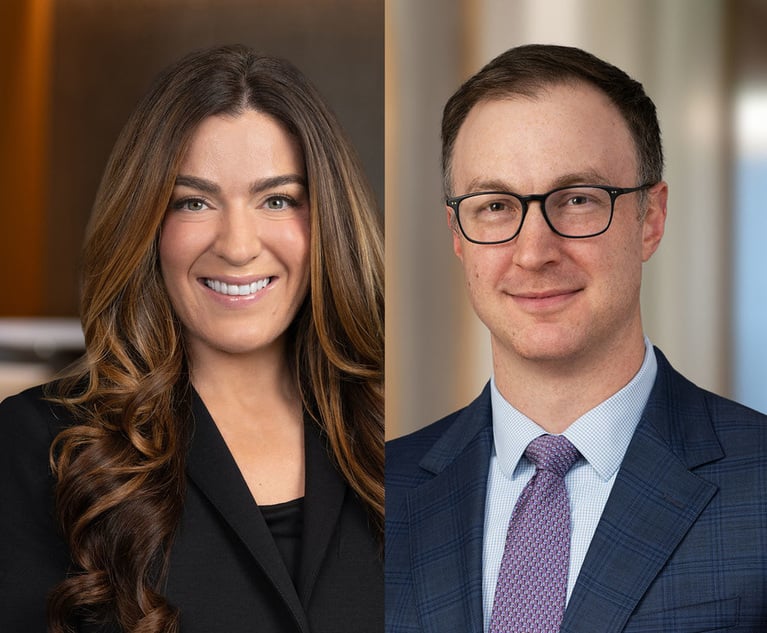 Harvey Weinstein. Photo: Lev Radin/Shutterstock.com
Harvey Weinstein. Photo: Lev Radin/Shutterstock.com Harvey Weinstein's Attorney Asks Judge to Toss Civil Sex-Trafficking Allegations
Elior Shiloh, who represents Weinstein, has warned in court filings that the judge failed to consider the legislative intent behind the statute, leading to a "domino effect" that caused its "flawed reasoning" to be adopted in two other cases.
November 06, 2019 at 07:37 PM
4 minute read
The original version of this story was published on New York Law Journal
An attorney for Harvey Weinstein on Wednesday asked a federal judge in Manhattan to dismiss sex-trafficking claims against his client, arguing that the allegations by actress Wedil David could not stand in light of a crucial ruling by the late Judge Robert W. Sweet.
Weinstein's lawyers, in a series of civil lawsuits, have criticized Sweet's landmark ruling last year, which allowed another actress to sue Weinstein under a federal sex-trafficking statute, after she alleged that Weinstein had sexually assaulted her in a hotel where the two had met under the guise of discussing a potential film opportunity.
Weinstein, who is facing an upcoming criminal trial in state court, has denied all allegations of forced sex.
According to Sweet, the interaction qualified as a "commercial sex act" under federal law because Weinstein, then considered one of the most powerful men in Hollywood, had offered her "something of value" in exchange for the meeting.
Elior Shiloh, who represents Weinstein, has warned in court filings that the judge failed to consider the legislative intent behind the statute, leading to a "domino effect" that caused its "flawed reasoning" to be adopted in two other cases.
"If this court allows [David] to move forward with her sex trafficking claim, the domino effect will continue and this court will be faced with a tidal wave of cases involving trafficking claims arising from any job interview or meeting in which there is a disparate level of power or fame," he wrote.
On Monday, Shiloh, a partner with Lewis Brisbois Bisgaard & Smith, reiterated his critique of Sweet's ruling, but also seemed to concede that it was "well reasoned" under the facts of that case.
He told U.S. District Judge Ronnie Abrams of the Southern District of New York that David's lawsuit simply attempted to piggy-back on the details alleged in Kadian Noble's complaint and that it lacked many of the key elements that allowed Sweet to reach his conclusion in the other case. According to Shiloh, David's suit failed to allege any repeated misrepresentations, and did not even allege when exactly the encounters with Weinstein took place.
"It's apples and oranges," he said. "It's just not the same case."
"If you apply Judge Sweet's ruling, the complaint should be dismissed," Shiloh said.
Kevin Mintzer, an attorney for David, countered Wednesday that all of the elements in the Noble case were present in his client's lawsuit as well. As outlined in court filings, Mintzer said, Weinstein had first assaulted David in 2015 after telling her he wanted to discuss a role in the Netflix series "Marco Polo" and then again in 2016 after he had given her the "impression" that she had gotten the job.
The role never materialized, but the assaults, he said, did, thanks to Weinstein's reputation at the time and his perceived ability to make careers.
"This case involves someone who is at the pinnacle of, was at the pinnacle of, his profession," Mintzer said.
The case, filed in 2015, also accused Weinstein's brother Bob and the former directors of their now-shuttered film studio of enabling Weinstein's conduct, even though they knew he was a danger to women.
Earlier this year, Abrams tossed the claims against The Weinstein Co.'s former directors, finding that they did not owe David a duty of care. An attorney for Bob Weinstein on Wednesday argued that negligence claims against his client should be dismissed on the same grounds.
The hearing ended without a ruling on either motion.
Read More:
This content has been archived. It is available through our partners, LexisNexis® and Bloomberg Law.
To view this content, please continue to their sites.
Not a Lexis Subscriber?
Subscribe Now
Not a Bloomberg Law Subscriber?
Subscribe Now
NOT FOR REPRINT
© 2025 ALM Global, LLC, All Rights Reserved. Request academic re-use from www.copyright.com. All other uses, submit a request to [email protected]. For more information visit Asset & Logo Licensing.
You Might Like
View All
The Week in Data Jan. 2: A Look at Legal Industry Trends by the Numbers

Chair of Montgomery McCracken Decamps for Morgan Lewis

Patent Disputes Over SharkNinja, Dyson Products Nearing Resolution
Trending Stories
- 1The Fearless Forecaster’s Employment Law Predictions for 2025
- 2Judicial Conference Declines Democratic Request to Refer Justice Thomas to DOJ
- 3People in the News—Jan. 2, 2025—Eastburn and Gray, Klehr Harrison
- 4Deal Watch: Latham, Paul Weiss, Debevoise Land on Year-End Big Deals. Plus, Mixed Messages for 2025 M&A
- 5Bathroom Recording Leads to Lawyer's Disbarment: Disciplinary Roundup
Who Got The Work
Michael G. Bongiorno, Andrew Scott Dulberg and Elizabeth E. Driscoll from Wilmer Cutler Pickering Hale and Dorr have stepped in to represent Symbotic Inc., an A.I.-enabled technology platform that focuses on increasing supply chain efficiency, and other defendants in a pending shareholder derivative lawsuit. The case, filed Oct. 2 in Massachusetts District Court by the Brown Law Firm on behalf of Stephen Austen, accuses certain officers and directors of misleading investors in regard to Symbotic's potential for margin growth by failing to disclose that the company was not equipped to timely deploy its systems or manage expenses through project delays. The case, assigned to U.S. District Judge Nathaniel M. Gorton, is 1:24-cv-12522, Austen v. Cohen et al.
Who Got The Work
Edmund Polubinski and Marie Killmond of Davis Polk & Wardwell have entered appearances for data platform software development company MongoDB and other defendants in a pending shareholder derivative lawsuit. The action, filed Oct. 7 in New York Southern District Court by the Brown Law Firm, accuses the company's directors and/or officers of falsely expressing confidence in the company’s restructuring of its sales incentive plan and downplaying the severity of decreases in its upfront commitments. The case is 1:24-cv-07594, Roy v. Ittycheria et al.
Who Got The Work
Amy O. Bruchs and Kurt F. Ellison of Michael Best & Friedrich have entered appearances for Epic Systems Corp. in a pending employment discrimination lawsuit. The suit was filed Sept. 7 in Wisconsin Western District Court by Levine Eisberner LLC and Siri & Glimstad on behalf of a project manager who claims that he was wrongfully terminated after applying for a religious exemption to the defendant's COVID-19 vaccine mandate. The case, assigned to U.S. Magistrate Judge Anita Marie Boor, is 3:24-cv-00630, Secker, Nathan v. Epic Systems Corporation.
Who Got The Work
David X. Sullivan, Thomas J. Finn and Gregory A. Hall from McCarter & English have entered appearances for Sunrun Installation Services in a pending civil rights lawsuit. The complaint was filed Sept. 4 in Connecticut District Court by attorney Robert M. Berke on behalf of former employee George Edward Steins, who was arrested and charged with employing an unregistered home improvement salesperson. The complaint alleges that had Sunrun informed the Connecticut Department of Consumer Protection that the plaintiff's employment had ended in 2017 and that he no longer held Sunrun's home improvement contractor license, he would not have been hit with charges, which were dismissed in May 2024. The case, assigned to U.S. District Judge Jeffrey A. Meyer, is 3:24-cv-01423, Steins v. Sunrun, Inc. et al.
Who Got The Work
Greenberg Traurig shareholder Joshua L. Raskin has entered an appearance for boohoo.com UK Ltd. in a pending patent infringement lawsuit. The suit, filed Sept. 3 in Texas Eastern District Court by Rozier Hardt McDonough on behalf of Alto Dynamics, asserts five patents related to an online shopping platform. The case, assigned to U.S. District Judge Rodney Gilstrap, is 2:24-cv-00719, Alto Dynamics, LLC v. boohoo.com UK Limited.
Featured Firms
Law Offices of Gary Martin Hays & Associates, P.C.
(470) 294-1674
Law Offices of Mark E. Salomone
(857) 444-6468
Smith & Hassler
(713) 739-1250









